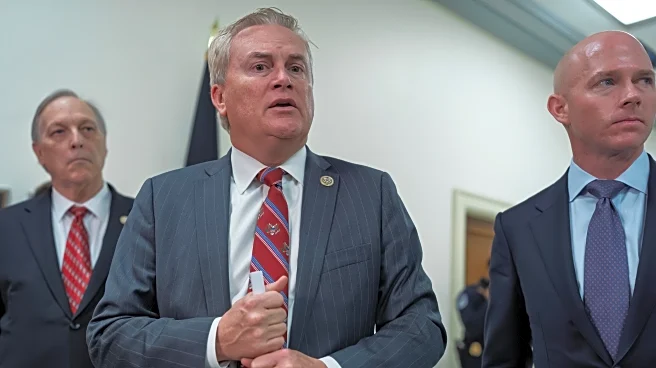What is the story about?
What's Happening?
The U.S. dollar is experiencing pressure as investors grow concerned over a potential government shutdown that could disrupt the release of key economic data, including the monthly jobs report. The shutdown threat arises from the expiration of government funding, which requires a last-minute agreement between Republicans and Democrats to avoid disruption. If the shutdown occurs, the U.S. Labor and Commerce departments have indicated that their statistics agencies would halt economic data releases, impacting the closely watched employment data for September. This data is crucial for Federal Reserve policymakers, who rely on it for decision-making. The dollar index has already fallen nearly 10% this year, with losses most notable against safe-haven currencies like the Japanese yen and Swiss franc. The yen, in particular, has strengthened against the dollar, reflecting growing U.S. political uncertainty.
Why It's Important?
The potential government shutdown and delay in economic data releases could have significant implications for U.S. monetary policy and economic stability. A prolonged shutdown may increase downside risks to economic growth and raise the likelihood of a more accommodative stance by the Federal Reserve. This situation could lead to increased volatility in currency markets, affecting international trade and investment. The dollar's weakness against safe-haven currencies suggests that investors are seeking stability amid political uncertainty. Additionally, the delay in the jobs report could leave the Federal Reserve without crucial labor market data, complicating its policy decisions. The broader impact on the U.S. economy could include reduced consumer and business confidence, potentially slowing economic activity.
What's Next?
If the government shutdown occurs, stakeholders will closely monitor its duration and impact on economic data releases. A brief shutdown may be largely ignored by the Federal Reserve, but a prolonged one could necessitate a more accommodative monetary policy. Investors and strategists are likely to adjust their positions based on developments, with some considering selling the dollar against the yen as a popular trade during the shutdown. The Federal Reserve's response to the situation will be critical, as it navigates potential interest rate adjustments amid incomplete economic data. Political leaders may face increased pressure to resolve funding issues to prevent further economic disruption.
Beyond the Headlines
The potential government shutdown highlights the fragility of political consensus in the U.S. and its impact on economic stability. It underscores the importance of timely and accurate economic data for policymaking and market confidence. The situation may also prompt discussions on the need for more robust mechanisms to prevent such disruptions in the future. The interplay between political decisions and economic outcomes could lead to long-term shifts in how investors perceive U.S. economic resilience and stability.


















